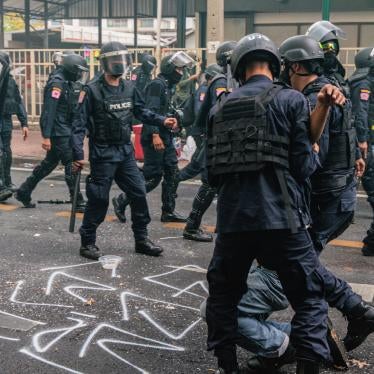Human Rights Watch today condemned Serbian Deputy Prime Minister Vojislav Seselj for his inflammatory and provocative statements against the foreign and Yugoslav media and human rights organizations, and called on the Yugoslav government publicly to denounce the use of violence against those reporting on the Kosovo crisis.
"These threats reveal the truly repressive nature of the Milosevic government," said Holly Cartner, Executive Director, Europe and Central Asia division of Human Rights Watch. "Ethnic Albanians are being victimized in Kosovo, but ethnic Serbs and foreigners critical of Milosevic's warmongering policies are not immune from government attacks."
Seselj and other high government officials such as the Serbian secretary of information, Alexander Vucic, and head of the Yugoslav United Left party, Mira Markovic (wife of President Milosevic) have repeatedly attacked the foreign media and independent news outlets inside Yugoslavia, such as Radio B92, Beta News Agency and the newspaper Nasa Borba, among others, for quote "betraying Serbian interests" and "provoking military intervention." In the past, the government has brought charges against some of these media for slander or disseminating misinformation, and dozens of independent radio and television stations have been denied licenses to broadcast.
In a Serbian parliament session on September 29, 1998 Deputy Prime Minister Seselj said:
If we cannot grab all their [NATO] planes, we can grab those within our reach, like various Helsinki committees, and Quisling groups.
In a press conference in Belgrade on October 1, Seselj proclaimed:
To those who we prove have participated in the service of foreign propaganda and those are the Voice of America, Deutsche Welle, Radio Free Europe, Radio France International, and the BBC radio service etc. If we find them in the moment of aggression they shouldn't expect anything good.
Human Rights Watch called on the Yugoslav government to denounce such threats and to guarantee the protection of human rights and media groups working in the Federal Republic of Yugoslavia.
"Such incitement to violence is a vulgar attempt to silence those reporting on atrocities in Kosovo," said Ms. Cartner. "Seselj's statements reveal the government's interest in repressing information about its involvement in war crimes."








